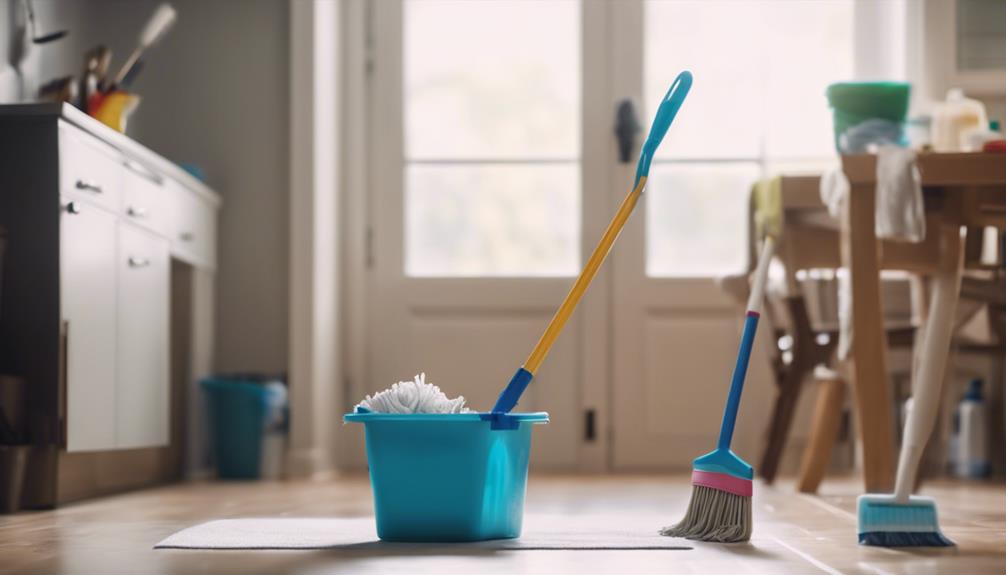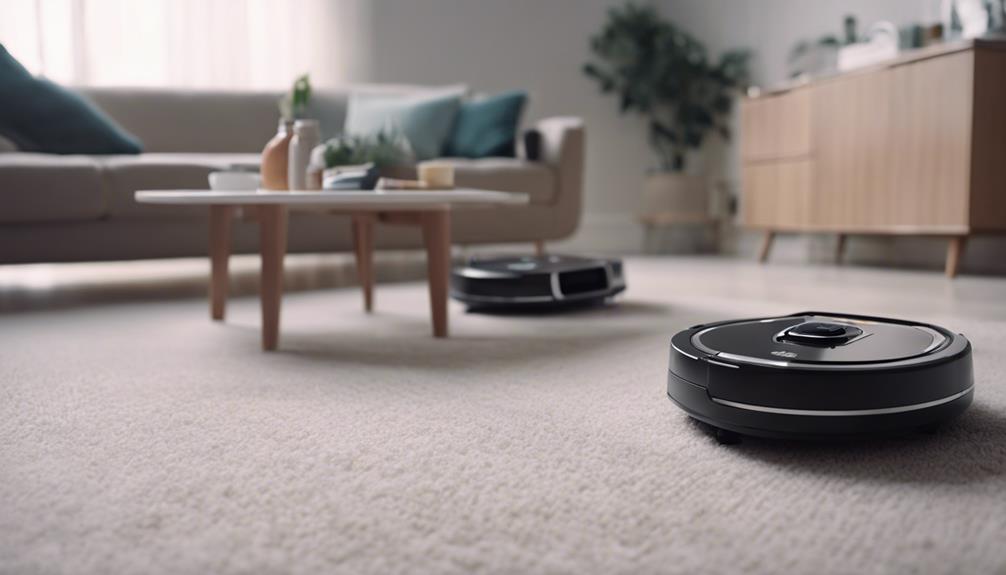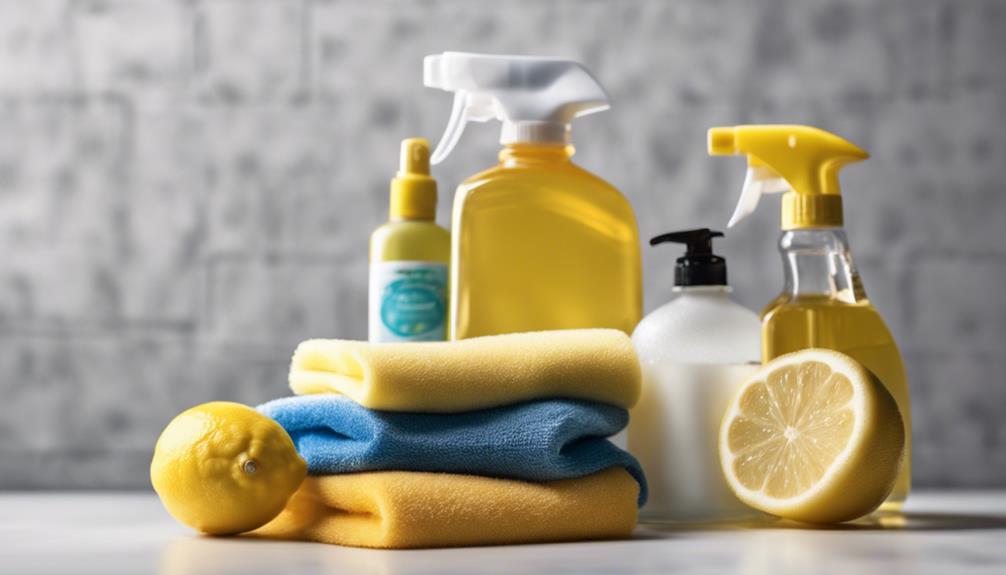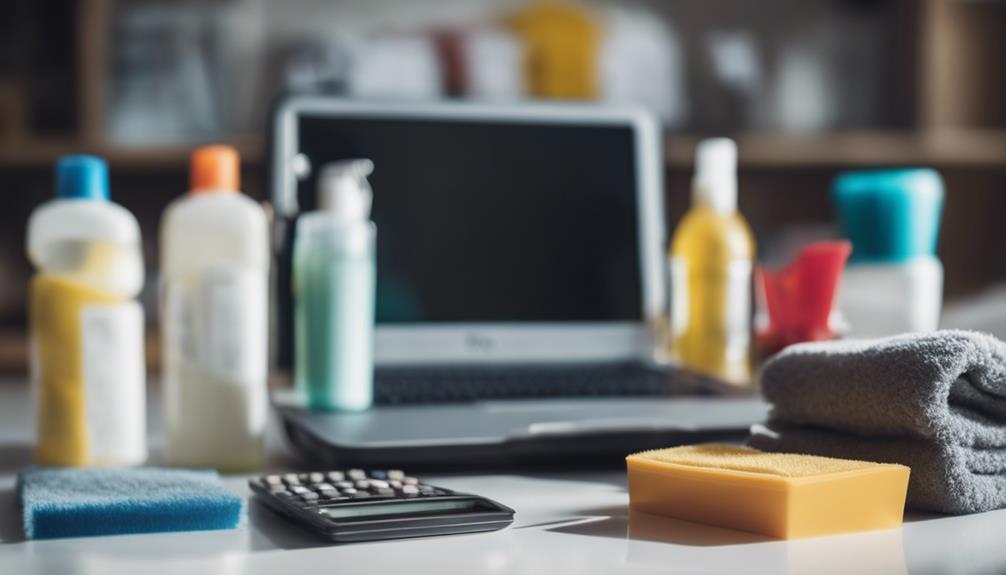By assessing the distinctive requirements of your household, you can make the most of your cleaning efforts. Begin by taking into account the size of your home, the number of occupants, and your daily habits. Establish a regular schedule that includes daily chores such as bed-making and countertop wiping, as well as dedicated time for thorough cleaning based on your specific needs. Simplifying tasks like decluttering and organizing laundry will also help streamline your cleaning routine. Divide your living space into different cleaning areas and concentrate on one area at a time to ensure a consistent cleaning schedule. By customizing your cleaning routine, you can keep your home fresh and healthy with minimal exertion, and you will discover more effective ways to fine-tune your cleaning rotation.
Key Takeaways
- Assess your home's cleaning needs based on size, occupants, and lifestyle to create a personalized schedule.
- Divide your home into cleaning zones to manage tasks systematically and focus on one zone at a time.
- Allocate time for daily, weekly, and monthly tasks, prioritizing high-traffic areas and tasks that require more attention.
- Incorporate habits into your daily and weekly routine, such as wiping down kitchen surfaces and dusting frequently used surfaces.
- Set aside time for deep cleaning tasks, adjusting frequency based on needs and seasons, and conduct thorough seasonal deep cleaning.
Assessing Your Cleaning Needs
To establish a cleaning schedule that truly works for you, begin by assessing your unique cleaning needs, taking into account factors like the size of your home, the number of occupants, and your lifestyle. This evaluation will help you pinpoint the specific cleaning tasks you need to address daily, weekly, and monthly.
For example, if you have pets or allergies, you may need to prioritize daily vacuuming or dusting. Conversely, if you live alone in a small apartment, your cleaning tasks may be less frequent.
By understanding your customized cleaning needs, you can allocate your time and energy efficiently. Don't forget to take into account your personal preferences and priorities, as they'll significantly impact the effectiveness of your cleaning schedule.
Creating a Weekly Routine
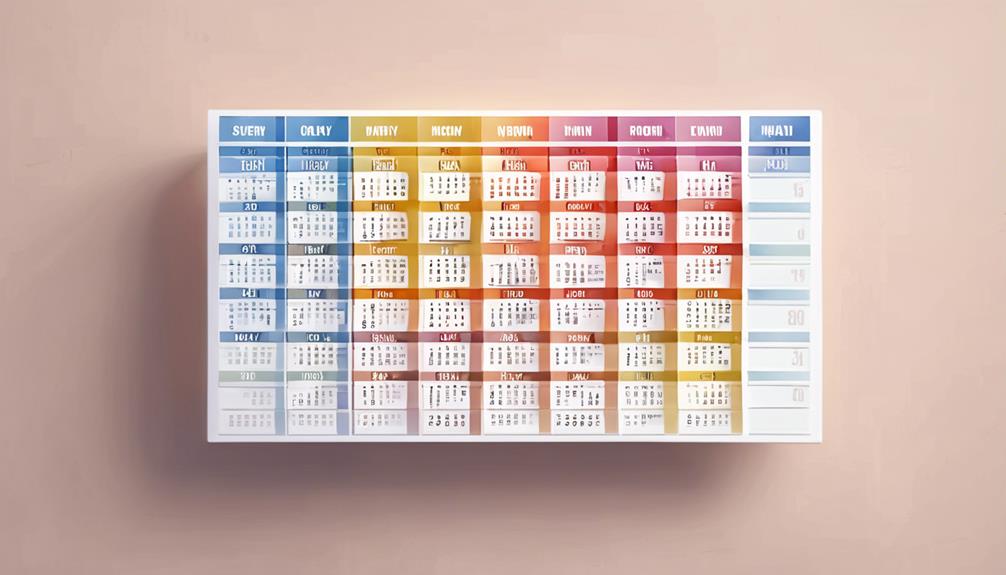
Now that you've assessed your cleaning needs, it's time to create a weekly routine that works for you.
You'll want to start by assigning daily tasks, prioritizing high-traffic areas that need extra attention, and designating specific chores to specific days.
Daily Tasks Assigned
Assigning specific daily tasks to each day of the week is crucial for maintaining a clean and organized home. By spreading out cleaning responsibilities evenly, you can ensure that your home remains consistently tidy. Start by incorporating essential daily tasks such as making beds, doing laundry, checking floors, and wiping counters into your daily routine.
These tasks may seem small, but they play a vital role in keeping your living space clean and organized. Decluttering on a daily basis can help prevent clutter from accumulating and make it easier to manage your cleaning routine. Completing these daily tasks will lay a strong foundation for your overall cleaning rotation.
Remember that daily tasks are the building blocks of a successful cleaning schedule. By staying on top of these tasks, you can guarantee that your home stays clean, organized, and clutter-free. With a consistent daily routine in place, you'll feel more confident when tackling deeper cleaning tasks, knowing that your daily responsibilities are well managed.
Prioritize High-Traffic Areas
By focusing on daily tasks, you've set the stage for a more thorough cleaning routine, and it's time to prioritize high-traffic areas in your weekly schedule. These areas, such as the foyer, stairs, bedrooms, bathrooms, and kitchen table, require extra attention to maintain a clean and inviting home. By prioritizing these spaces, you'll establish a hygienic environment and prevent the spread of germs.
Incorporating high-traffic areas into your weekly routine allows you to effectively manage the cleanliness of your home. You'll be able to consistently address these areas, keeping your living spaces always ready for use and enjoyment. Remember, regularly cleaning high-traffic areas is essential for maintaining a clean and healthy home.
Assign Chores to Days
Divide your week into manageable chunks by allocating specific cleaning tasks to each day, ensuring a consistent flow of cleaning activities throughout the week. This approach helps distribute tasks evenly, preventing feelings of overwhelm and ensuring all areas of your home receive attention.
By assigning chores to designated days, you'll stay organized and efficient in your cleaning responsibilities.
For instance, you could dedicate Mondays to dusting and polishing, Tuesdays to laundry, and Wednesdays to bathroom cleaning. This weekly cleaning schedule allows you to focus on specific tasks each day, making time management a breeze.
As a result, you'll maintain a clean and organized home throughout the week. By following this routine, you'll find that cleaning responsibilities become less challenging, and your home will sparkle with a sense of efficiency.
Stay organized, assign chores to days, and watch your cleaning tasks become a well-oiled machine!
Allocating Time for Deep Cleaning

As you allocate time for deep cleaning, you'll need to prioritize tasks, considering the frequency of each task and the changing seasons.
You'll want to tackle daily tasks that require attention, adjust the frequency of tasks based on your needs, and adapt to seasonal changes that impact your cleaning routine.
Daily Tasks Prioritized
To maintain a clean and organized home, allocate specific times of the day for daily tasks like making beds, checking floors, and wiping counters. This helps guarantee dirt and clutter from building up. By prioritizing these daily tasks, you'll secure that your home stays clean and organized.
Daily tasks like doing laundry, decluttering, and wiping counters are essential in maintaining a clean home. When you prioritize these tasks, you're averting dirt and clutter from building up, making deep cleaning sessions more manageable and efficient.
Consistently performing daily tasks can lessen the need for extensive cleaning sessions and contribute to a cleaner living environment. By incorporating deep cleaning tasks into your daily routine, you can uphold a consistently clean and organized home without feeling overwhelmed.
Allocate time for deep cleaning tasks, and you'll be able to tackle those tasks efficiently. Remember, prioritizing daily tasks is key to staying organized and efficient in your cleaning routine.
Task Frequency Matters
By designating specific times for deep cleaning tasks, you guarantee that your home receives the thorough attention it needs to stay clean and organized. To secure this, you need to allocate time for deep cleaning tasks, which can be categorized into monthly and seasonal tasks.
| Task Frequency | Task Description |
|---|---|
| Monthly | Regular decluttering of pantry items and cabinets, kitchen appliance maintenance, checking for leaks under sinks and around fixtures |
| Monthly | Deep cleaning of high-traffic areas, dusting and polishing furniture |
| Seasonal | Vacuuming mattresses and rotating area rugs for thorough upkeep |
| Seasonal | Conducting a seasonal deep cleaning of upholstery, windows, and fireplaces |
| Seasonal | Pantry organization and upholstery cleaning for a fresh and clean home environment |
Seasonal Deep Cleaning
Setting aside dedicated time for seasonal deep cleaning allows you to tackle those often-overlooked areas and tasks that require extra attention, guaranteeing a more thorough and efficient cleaning process.
By allocating time for seasonal deep cleaning, you'll be able to address tasks that don't fit into your daily or weekly cleaning routines. This includes thorough tasks like cleaning kitchen appliances, decluttering, and inspecting for leaks.
You'll also want to vacuum mattresses, rotate area rugs, and conduct seasonal cleanings of upholstery, windows, and fireplaces.
Regular deep cleaning helps maintain a cleaner and healthier living environment by addressing hidden dirt and grime that can accumulate over time.
By incorporating tasks like cleaning trash cans, recycling bins, and checking for leaks under sinks into your seasonal deep cleaning routine, you'll make sure that overlooked areas are addressed, promoting a more organized and efficient home.
Decluttering for Efficiency

As you start on the journey to a more efficient cleaning routine, addressing clutter becomes an essential first step. Decluttering is important for creating a space that's easy to clean and maintain. By removing unnecessary items, you'll reduce visual distractions and create a sense of calm in the space. This, in turn, allows for easier moving around and access to cleaning areas, making your cleaning schedule more effective.
Regular decluttering also minimizes dust accumulation, simplifying cleaning tasks and reducing the time spent on dusting and polishing. Additionally, it prevents the buildup of items that can impede your cleaning routines. By organizing your space, you'll be able to focus on cleaning rather than dealing with clutter.
Streamlining Laundry Tasks
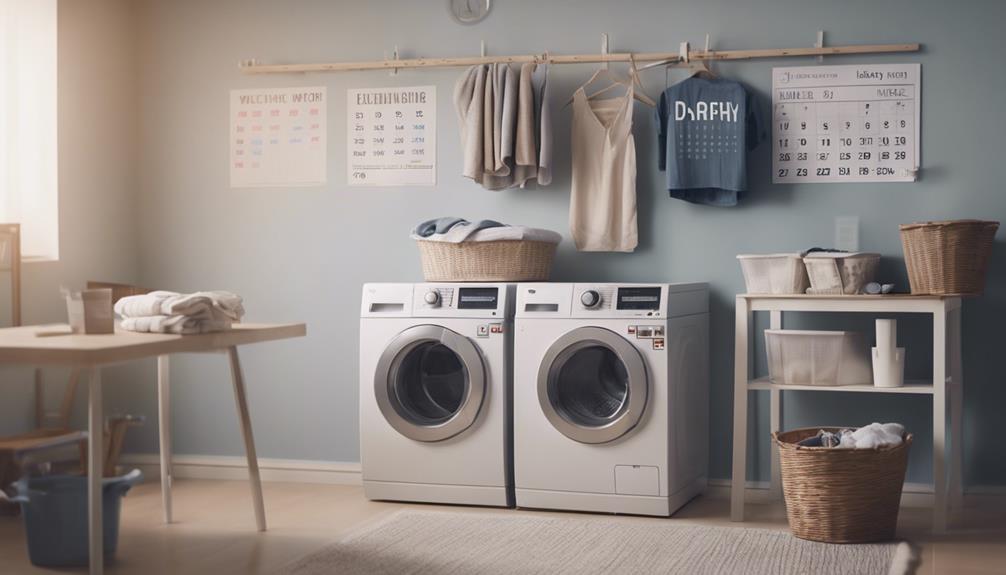
Your laundry room is a hub of activity, and streamlining tasks in this space can have a significant impact on your overall cleaning schedule.
By optimizing your laundry tasks, you'll save time and energy in the long run. Start by sorting your laundry by color and fabric type to prevent color bleeding and damage. Use laundry baskets or hampers to keep your dirty clothes organized and separate.
When it's time to wash, optimize your washing machine settings for different types of laundry loads. Don't forget to implement effective stain removal techniques to maintain the quality of your clothing.
Once the wash cycle is complete, fold your laundry immediately to prevent wrinkles and put it away promptly to keep your space tidy. By following these simple steps, you'll be able to tackle your laundry tasks with ease and efficiency.
With a streamlined laundry routine, you'll have more time to focus on other areas of your cleaning schedule.
Cleaning Zones for Organization

By dividing your home into distinct cleaning zones, you'll be able to tackle specific areas like bedrooms, bathrooms, kitchen, and living spaces with ease and efficiency. This approach helps you manage your cleaning tasks systematically, making sure that no area is overlooked.
By dividing your home into manageable sections, you can focus on specific areas, one zone at a time. This zone-based approach allows you to allocate specific days or weeks to each zone, maintaining a consistent cleaning routine.
With cleaning zones, you'll guarantee thorough cleaning and prevent overlooking areas. Assigning zones to specific days or weeks helps you uphold a consistent cleaning routine. The rotation of cleaning zones ensures that all areas receive regular attention and care.
Maintaining a Fresh Home
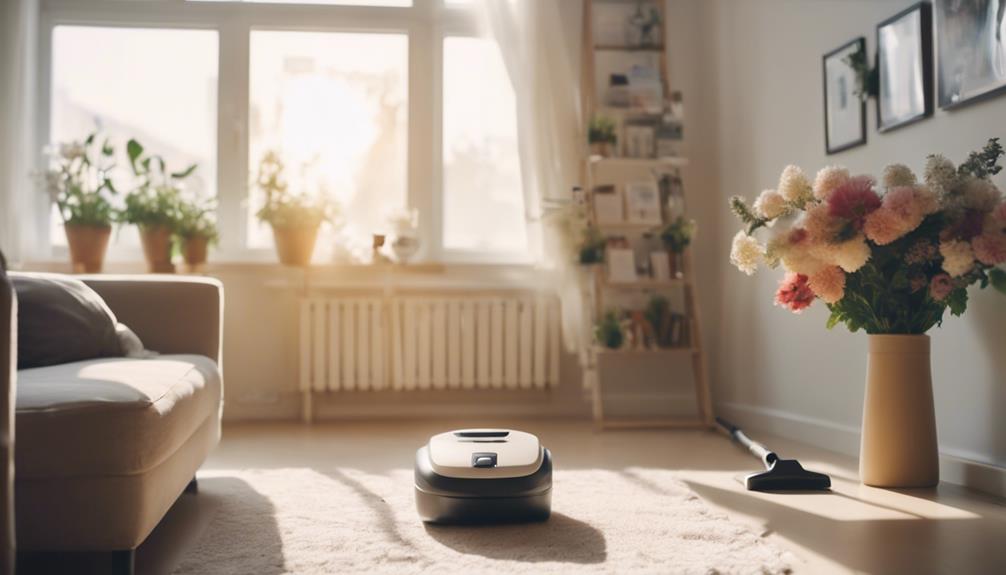
You can maintain a fresh home by incorporating simple habits into your daily and weekly cleaning routine. This will help you stay organized and efficient in your cleaning schedule.
By regularly wiping down kitchen appliances and surfaces, you'll prevent the buildup of grime and bacteria. Additionally, dusting frequently used surfaces and furniture reduces allergens and improves indoor air quality.
Inspecting and maintaining plumbing fixtures can also prevent costly repairs and water damage in the long run. Moreover, laundering and changing bedding and linens weekly promotes better sleep and hygiene.
Frequently Asked Questions
How Do You Organize a Cleaning Schedule?
You organize a cleaning schedule by listing weekly tasks, breaking them down by area or room, allocating time based on effort required, and distributing tasks evenly throughout the week for maximum efficiency.
What Is an Example of a Cleaning Schedule?
As you step into the domain of cleaning, imagine a symphony of tasks harmoniously orchestrated to create a serene space. For you, a cleaning schedule might include daily tidying, weekly bathroom scrubbing, and monthly decluttering sessions to maintain a blissful balance.
How to Stay Clean and Organized?
You stay clean and organized by establishing a daily routine, prioritizing tasks, and allocating time for weekly and monthly cleaning, ensuring a consistently tidy and clutter-free living space that reflects your personal style.
How Do You Prioritize Cleaning Tasks to Ensure Efficiency?
As you weave through the tangled web of cleaning tasks, prioritize like a pro by tackling high-traffic areas first, then allocate time for deep cleaning and disinfecting, ensuring a healthier living space that shines like a polished gem.
How Can I Incorporate Effective Cleaning Practices into My Cleaning Rotation or Schedule?
Incorporating effective cleaning practices into your rotation or schedule is essential to maintain a clean and healthy home. To achieve this, it’s important to prioritize the objective of housekeeping uncovered secrets. By scheduling specific tasks on certain days and using efficient cleaning products, you can ensure that your home is always tidy and organized.
Conclusion
By following your customized cleaning rotation, you'll be flaunting a flawlessly fresh fortress in no time!
Fresh floors, fragrant fabrics, and flawlessly filthy-free zones will be your new normal.
As you master your mess, you'll marvel at the magic of a maintained home, where every minute matters and messes meet their match.
